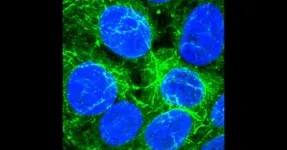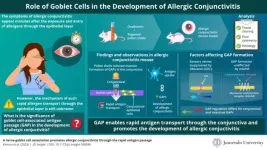(Press-News.org) Washington, D.C. – Blue light kills both dried cells and biofilms of the pathogen Listeria monocytogenes, a frequent contaminant of food processing facilities. Demise of L. monocytogenes occurred quickest when cells or biofilms were placed on polystyrene, a widely used, transparent form of plastic. The research is published in Applied and Environmental Microbiology, a journal of the American Society for Microbiology.
“These results contribute to advancing our understanding of the potential of blue light to treat inert surfaces contaminated with L. monocytogenes,” said corresponding author Francisco Diez-Gonzalez, Ph.D., Director and Professor, Center for Food Safety, University of Georgia. Although biofilms of pathogens are generally powerfully resistant to being exterminated, the results suggest that blue light could effectively destroy L. monocytogenes.
In the study, the investigators deposited liquid suspensions of mixtures of 5 strains of L. monocytogenes on small, sterile rectangular plates made of 6 different materials, including polystyrene, stainless steel and silicone rubber, which were then allowed to dry. The investigators also used similar plates to grow biofilms, which they also allowed to dry.
Then, they shined blue light onto the biofilms and onto the dried suspensions of cells on the plates to determine the most effective combinations of doses and wavelengths, as well as the most effective surfaces on which to extirpate the pathogens.
“The application of blue light for controlling microbial contamination has the potential to offer an additional technology that could complement existing methods for disinfecting surfaces in contact with foods,” said Diez-Gonzalez, noting that blue light has been used for disinfection in hospitals. As compared to ultraviolet light, blue light offers reduced risk for the user, he said.
A post-doc in Diez-Gonzalez’ laboratory, Fereidoun Forghani, Ph.D., kick-started the investigation when—searching for new ideas—he came across the use of blue light as a potential antimicrobial intervention to sanitize surfaces. Forghani built some blue light prototypes and produced the first preliminary results treating pure cultures of Listeria.
###
The American Society for Microbiology is one of the largest professional societies dedicated to the life sciences and is composed of 36,000 scientists and health practitioners. ASM's mission is to promote and advance the microbial sciences.
ASM advances the microbial sciences through conferences, publications, certifications, educational opportunities and advocacy efforts. It enhances laboratory capacity around the globe through training and resources. It provides a network for scientists in academia, industry and clinical settings. Additionally, ASM promotes a deeper understanding of the microbial sciences to diverse audiences.
END
Pathogen that plagues food processing plants eradicated by blue light
2023-10-17
ELSE PRESS RELEASES FROM THIS DATE:
Public health interventions prevented transmission within BU most SARS-CoV-2 cases
2023-10-17
(Boston)— SARS-CoV-2, the causative agent of COVID-19, began impacting the U.S. in March 2020 with many schools and universities shifting to remote education by early April 2020 in response to the public health emergency. Despite public health interventions (increased ventilation, masking policies, surveillance testing, contact tracing of confirmed cases and quarantine procedures for infected students, faculty and staff) there were still concerns that institutes of higher education would be a hotbed of transmission, including transmission from students into surrounding communities.
But, were these fears warranted?
A ...
CastleVax Inc. receives BARDA project NextGen award valued at up to $338 million to advance intranasal NDV-based COVID-19 booster vaccine into phase 2b clinical efficacy testing
2023-10-17
CastleVax, a clinical stage vaccine platform company, has received a Project NexGen award valued at up to $338 million from the Biomedical Advanced Research and Development Authority (BARDA), part of the Administration for Strategic Preparedness and Response (ASPR) in the U.S. Department of Health and Human Services (HHS), to support the development of a next-generation, booster vaccine to protect against COVID-19 for years to come. The initial phase of the award provides approximately $8.5 million to plan a Phase 2b clinical trial that would compare CastleVax’s vaccine to currently ...
New cancer therapy target stops tumor cells from sharing resources
2023-10-17
Researchers at University of California San Diego have discovered a process in which liver cells share molecules via vesicle exchange in order to multiply under conditions that would ordinarily suppress cell proliferation. They also found evidence that this process occurs in various types of cancer cells, paving the way for a new approach to tackling treatment resistance in cancer. The findings were published on October 17, 2023 in eLife.
“Understanding cell proliferation is a fundamental issue in both cancer research and biomedical science as a whole,” said Gen-Sheng Feng, PhD, a professor of pathology at UC San Diego School of Medicine and of molecular biology ...
International team reveals source of largest ever Mars quake
2023-10-17
A global team of scientists have announced the results of an unprecedented collaboration to search for the source of the largest ever seismic event recorded on Mars. The study, led by the University of Oxford, rules out a meteorite impact, suggesting instead that the quake was the result of enormous tectonic forces within Mars’ crust.
The quake, which had a magnitude of 4.7 and caused vibrations to reverberate through the planet for at least six hours, was recorded by NASA’s InSight lander on May 4 2022. ...
The dark side of the American lawn
2023-10-17
The American residential lawn is, for many, an iconic landscape and about half of homeowners in the US use fertilizer to keep their yards green and lush. Some proportion of the nitrogen in this fertilizer enters the broader environment, with negative consequences including algal blooms and deoxygenated waters. Peter Groffman and colleagues studied residential landscapes in the Baltimore, Maryland metropolitan area, which drains to the Chesapeake Bay, seeking to identify locations (hotspots) or times (hot moments) with disproportionately high rates of nitrogen export. The authors went to lawns in exurban, ...
New study sheds light on the developmental mechanism of allergic conjunctivitis
2023-10-17
When it comes to eye allergies, the transition from allergen contact to bothersome symptoms has always been quick, appearing within a span of a few minutes. The initial stage of allergic conjunctivitis involves the penetration of allergen through the epithelial cell layer (cells covering the outer surface of the body). However, the exact mechanism underlying the rapid allergen transfer has remained a mystery so far.
Fortunately, in a new ground-breaking study published in the journal JCI Insight on October 11, 2023, researchers from Juntendo ...
Western University researchers reveal link between Alzheimer’s and sex hormones
2023-10-17
LONDON, ON., CA:
Alzheimer’s disease disproportionately affects women, who represent about two-thirds of those diagnosed with the late-onset type of the disease.
Previous research has shown Alzheimer’s is also more severe and progresses more rapidly in women, and women with Alzheimer’s experience a steeper cognitive decline – loss of memory, attention, and the ability to communicate and make decisions – compared to men with the disease.
The biological bases for these differences between men and women with Alzheimer’s disease are not well understood. ...
How to help save plants from extinction
2023-10-17
Now is the time to identify the conditions that cause plants to die. Doing so will allow us to better protect plants by choosing conservation targets more strategically, UC Riverside botanists argue in a new paper.
Published in the Oxford Academic journal Conservation Physiology, the paper demonstrates how scientists can learn the limits past which plants’ vital functions shut down, and makes the case that not doing so is a mistake in this era of increasing drought and wildfires.
“We can measure the amount of water loss plants ...
Kennedy Krieger receives $5 million grant to expand reach of its pediatric post-COVID-19 clinic and support school students
2023-10-17
BALTIMORE, October 17, 2023—Researchers at Kennedy Krieger Institute have received a $5 million grant from the U.S. Department of Health and Human Services (HHS), through the Agency for Healthcare Research and Quality (AHRQ), to expand access to comprehensive care for children and adolescents with long COVID-19, particularly among underserved populations.
During the five-year project, researchers at the Pediatric Post-COVID-19 Rehabilitation Clinic will receive up to $1 million annually to expand and strengthen its integrative services in Baltimore and the overall mid-Atlantic ...
Can lifestyle interventions benefit patients with advanced breast cancer?
2023-10-17
MIAMI, FLORIDA (Oct. 17, 2023) – Can lifestyle interventions such as exercise and intermittent fasting help patients with advanced breast cancer better tolerate side effects from treatment?
That is the question Tracy Crane, PhD, RDN, and Carmen Calfa, MD, at Sylvester Comprehensive Cancer Center at the University of Miami Miller School of Medicine and their collaborators will strive to answer with a $4-million, five-year grant from the National Cancer Institute (NCI).
Crane, co-lead of Cancer Control and director of Lifestyle Medicine, Prevention and ...




